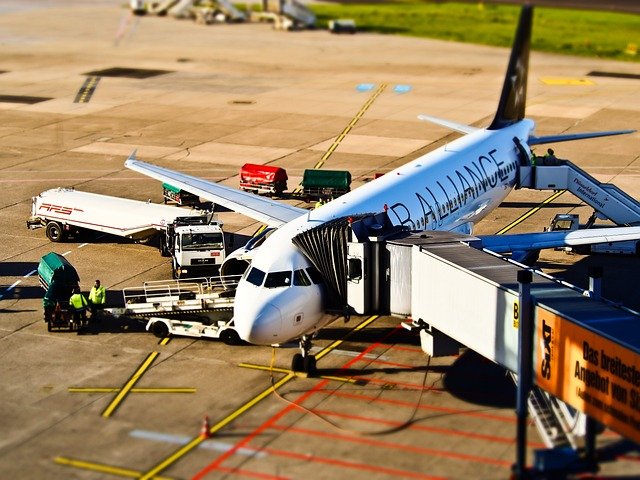Start Your Career in Aviation with Professional Airport Training Programs
The aviation industry offers dynamic career opportunities for those ready to train and grow in a fast-paced environment. Across the U.S., training centers are preparing candidates for roles in airport operations, ground crew, airline services, and more. These programs provide practical knowledge and certifications that help you enter the workforce with confidence. Whether you're starting fresh or transitioning careers, aviation-focused job training can open doors to reliable employment and long-term career paths in a vital, high-demand industry.

What types of aviation training programs are available?
Aviation training programs come in various forms, catering to different aspects of the industry. Some common types include:
-
Airport Operations: These programs focus on the day-to-day management of airport facilities, including terminal operations, security procedures, and passenger services.
-
Ground Crew Training: This type of training prepares individuals for roles such as baggage handling, aircraft marshalling, and ground support equipment operation.
-
Airline Customer Service: Programs in this category teach skills needed for ticketing, check-in procedures, and passenger assistance.
-
Aviation Safety and Security: These specialized courses cover critical aspects of maintaining safety protocols and security measures within airports and airlines.
-
Air Traffic Control: While more advanced, some programs offer introductory courses in air traffic control principles and procedures.
How can I begin a career in aviation?
Starting a career in aviation involves several steps:
-
Research the various roles and career paths available in the industry to identify areas that interest you.
-
Assess your skills and qualifications to determine which aviation jobs align with your strengths and experience.
-
Look for entry-level aviation training programs offered by reputable institutions or aviation academies.
-
Obtain necessary certifications or licenses required for your chosen career path.
-
Gain practical experience through internships or entry-level positions at airports or airlines.
-
Network with industry professionals and join aviation-related associations to stay informed about job opportunities and industry trends.
What are the benefits of airport job training opportunities?
Airport job training opportunities offer numerous advantages for those looking to enter the aviation industry:
-
Specialized Knowledge: These programs provide in-depth understanding of airport operations, safety protocols, and industry standards.
-
Hands-on Experience: Many training programs include practical components, allowing students to gain real-world experience in simulated airport environments.
-
Industry Connections: Training programs often have partnerships with airports and airlines, providing networking opportunities and potential job placements.
-
Career Advancement: The skills and certifications gained through these programs can lead to faster career progression and higher-paying positions.
-
Adaptability: The knowledge acquired is transferable across various aviation roles, offering flexibility in career choices.
How do I learn airport operations and safety?
Learning airport operations and safety involves a combination of theoretical knowledge and practical training:
-
Enroll in accredited aviation training programs that offer comprehensive courses in airport operations and safety.
-
Participate in workshops and seminars conducted by industry experts to gain insights into current practices and emerging trends.
-
Seek internships or part-time positions at local airports to gain firsthand experience in operational procedures and safety protocols.
-
Study industry regulations and guidelines set by organizations such as the Federal Aviation Administration (FAA) and International Civil Aviation Organization (ICAO).
-
Engage in online courses and webinars that focus on specific aspects of airport operations and safety management systems.
What are the key skills needed for jobs in airline services?
Jobs in airline services require a unique set of skills to ensure smooth operations and excellent customer service:
-
Communication: Clear and effective communication is crucial when dealing with passengers, crew members, and other airport staff.
-
Problem-solving: The ability to think on your feet and resolve issues quickly is essential in the fast-paced aviation environment.
-
Attention to detail: Accuracy is paramount in tasks such as ticketing, baggage handling, and security procedures.
-
Customer service: A friendly and professional demeanor is necessary when interacting with diverse groups of travelers.
-
Adaptability: The aviation industry is dynamic, requiring employees to adjust to changing schedules, regulations, and technologies.
-
Teamwork: Collaboration with various departments and personnel is crucial for efficient airport operations.
-
Stress management: The ability to remain calm and focused during high-pressure situations is vital in aviation roles.
How much do aviation training programs typically cost?
The cost of aviation training programs can vary significantly depending on the type of program, duration, and institution offering the training. Here’s a general overview of typical costs:
| Program Type | Duration | Estimated Cost Range |
|---|---|---|
| Airport Operations Certificate | 3-6 months | $2,500 - $5,000 |
| Ground Crew Training | 2-4 weeks | $1,000 - $3,000 |
| Airline Customer Service Course | 4-8 weeks | $1,500 - $4,000 |
| Aviation Safety and Security Program | 2-3 months | $3,000 - $6,000 |
| Air Traffic Control Basics | 6-12 months | $5,000 - $15,000 |
Prices, rates, or cost estimates mentioned in this article are based on the latest available information but may change over time. Independent research is advised before making financial decisions.
It’s important to note that many airports and airlines offer on-the-job training programs that may be less expensive or even free for new hires. Additionally, some community colleges and technical schools offer aviation-related programs at more affordable rates compared to specialized aviation academies.
In conclusion, professional airport training programs provide a valuable gateway into the aviation industry. By offering specialized knowledge, hands-on experience, and industry-recognized certifications, these programs prepare individuals for rewarding careers in various aviation roles. Whether you’re interested in airport operations, airline services, or ground crew positions, investing in quality aviation training can set you on a path to a successful and dynamic career in this ever-evolving industry.




